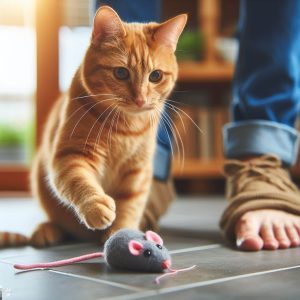Bringing home a new kitten is an exciting time. Between all of the snuggles, playtime and training, the first few weeks fly by in a flash. But it’s also an important period for your kitten’s health. Vaccinating your kitten on schedule is crucial to protecting them from dangerous diseases.
After your kitten’s first round of vaccines, you may notice a change in their behavior. Many kittens tend to sleep more or seem less energetic the day after vaccination. If your once lively, energetic kitten is suddenly sleeping all day and not as playful, you may be wondering if something is wrong.
Don’t worry – this is totally normal! Sleeping all day after vaccination is a common side effect and nothing to be concerned about in most cases. However, there are some key things you’ll want to keep an eye out for to ensure your kitten is recovering properly.
In this article, we’ll cover:
- Why kittens sleep so much after vaccines
- Normal vs abnormal behavior to watch for
- Tips for caring for your sleepy kitten
- When to call the vet
- Completing your kitten’s vaccine schedule
Follow these tips for keeping your vaccinated kitten healthy, happy and sleeping soundly!
Why Kittens Sleep More After Vaccines
It’s natural to be concerned if your energetic little fuzzball suddenly turns into a sleepy couch potato after their shots. But there’s no need to worry – their tiredness is actually a sign that the vaccine is working effectively.
Here’s why kittens tend to sleep more after vaccination:
Immune System Activation
Vaccines contain small amounts of antigens that trigger your kitten’s immune system to produce antibodies. Their body thinks the antigens are from real viruses or bacteria, so it activates its defenses.
This process of revving up their immunity takes a lot of energy and can make your kitten tired afterwards. Their immune system is hard at work building up antibodies – rest allows this process to happen more quickly.
Inflammation at Injection Site
The area on your kitten’s skin where the vaccine was injected into may become slightly swollen, sore or inflamed. This local reaction can cause discomfort, making your kitten less energetic and more inclined to rest.
Side Effects
Just like human vaccines, kitten shots can occasionally cause mild side effects like:
- Fatigue
- Low appetite
- Mild fever
- Body aches
These vaccine side effects are short-lived but can leave your kitten feeling temporarily under the weather and wanting to sleep. Resting helps them recover more quickly.
Young Immune System
Kittens have immature immune systems that are encountering vaccines for the first time. Their bodies work extra hard to build immunity against new antigens, making them more tired than adult cats receiving booster shots.
Now that you know why your kitten is suddenly snoozing all day, let’s look at what’s normal and what to watch out for.
Normal vs. Abnormal Behavior After Vaccines
While it’s common for kittens to be sleepier after vaccination, you’ll still want to monitor their behavior closely. Here are some guidelines on normal vs abnormal behavior to watch for:
Normal Sleepy Behavior
It’s normal for your kitten to:
- Sleep more hours per day – Up to 18-20 hours isn’t unusual
- Take long naps – Let them sleep as long as they need
- Be less energetic – More quiet play and cuddling vs active playtime
- Have a reduced appetite – They may eat slightly less than usual
- Want to rest in comfortable spaces – Provide soft beds and blankets
As long as your kitten is still eating, drinking and going to the bathroom normally, additional sleep is nothing to worry about. Make sure you are scheduled to come back to the vet in 3-4 weeks for the next round of shots.
Abnormal Behavior to Watch For
Contact your vet if you notice any of the following:
- No interest in food or water for over 24 hours
- Repeated vomiting or diarrhea
- Swelling, hives or trouble breathing
- Persistent crying or signs of pain
- Extreme lethargy – unable to wake kitten or interact
- Seizures
- Anything else that concerns you
If your kitten displays any abnormal behaviors, call your vet right away to determine if medical care is needed. Now let’s go over some tips for caring for your sleepy kitten.
Tips for Caring for Your Sleepy Kitten
Here are some simple ways to keep your tired kitten healthy and comfortable after their shots:
Allow Plenty of Rest
Let your kitten sleep and recover as much as needed. Now is not the time to introduce new training or force interactions. Quiet time in a dimly lit room allows deep sleep. Separate them from noisy children or pets if possible. Soft towels in a box or hiding spot creates a cozy napping space.
Check Their Appetite
Make sure your kitten is eating and drinking normally. Offer their favorite canned kitten food or add a teaspoon of water to dry kibble to increase moisture. If they show no interest in food after 24 hours, call your vet. A nutritional supplement or fluids under the skin may be needed.
Monitor the Injection Site
Check where your kitten received the vaccine. Look for significant swelling, redness, pain or drainage. Apply a warm compress for 10 minutes 3 times a day to soothe minor soreness. If their discomfort worsens, have the vet examine.
Help Them Feel Comfortable
Let your kitten guide you to what makes them most comfortable. Offer different resting spots like soft beds, towels or your lap until they settle in. Gently pet or brush them if they seem to enjoy it. Keep the room at a calm, quiet volume.
Avoid Stress
Skip the noisy vacuum, loud music or boisterous play sessions. Help your kitten conserve energy by preventing stressful situations. Introduce new foods, toys or experiences after they are back to 100%. overstimulation can slow recovery.
By letting your kitten rest and recover properly, you can help them bounce back quickly from vaccine side effects. But when should you make that call to the vet?
When to Call Your Vet After Vaccination
In most cases, sleepiness and low energy will resolve within 48 hours post-vaccination. But contact your vet promptly if you notice any of the following:
Lack of Appetite
If your kitten refuses food and water or can’t keep anything down for 12-24 hours, call your vet. Dehydration and blood sugar issues are serious risks for kittens. They may need fluids, anti-nausea medication or appetite stimulants.
Difficulty Breathing
Allergic reactions or anaphylaxis are rare vaccine complications. But they constitute an emergency. If your kitten develops facial swelling, hives, wheezing or trouble breathing, bring them to emergency vet care right away.
Seizures
Seizures or convulsions are abnormal post-vaccine reactions that require immediate vet attention to determine their cause and treat properly. Time is of the essence.
Persistent Vomiting or Diarrhea
Kittens can easily become dehydrated if unable to hold down food or water. Call your vet if vomiting or diarrhea lasts more than 24 hours so they can provide supportive treatment.
Significant Pain
Excessive crying, whining, aggression or hiding could signal your kitten is in severe discomfort. Have your vet examine for problems like nerve injury at the injection site or joint swelling.
Anything Else Unusual
Trust your gut. You know your kitten best. If their behavior seems off or very abnormal for their personality, don’t hesitate to call your vet and describe the symptoms. It’s always better to be safe.
While most kittens recover quickly after vaccines, some experience more pronounced side effects. Your vet can advise you on caring for them and decide if medication is needed.
Completing Your Kitten’s Vaccine Schedule
One important reason to monitor your kitten closely after vaccination is to ensure they are healthy enough for their next round of shots. Kittens need a series of vaccines and boosters over about 16 weeks to become fully protected against contagious diseases.
Why Follow the Schedule
Spacing out multiple vaccine doses allows your kitten’s immunity to strengthen gradually. Following your vet’s schedule is crucial, because skipping or delaying doses leaves gaps in their protection.
Which Vaccines Are Recommended
Core kitten vaccines recommended for all cats include:
- Distemper virus – Prevents panleukopenia which can be deadly
- Calicivirus – Causes oral ulcers and upper respiratory issues
- Herpesvirus – Leads to rhinotracheitis upper respiratory infection
- Rabies – Required by law; prevents fatal viral infection
Other non-core vaccines may be suggested based on risk, such as feline leukemia virus. Discuss your kitten’s individual needs with your vet.
What to Expect
The initial kitten vaccine series is typically given starting around 6-8 weeks of age, with boosters every 3-4 weeks until 16 weeks old. Expect your kitten to be most sleepy and “under the weather” after their very first injection. Side effects are usually less pronounced for subsequent doses as immunity develops.
While annoying, mild sleepiness is a small price to pay for your kitten’s future health and wellbeing. Be sure to schedule that next vet visit right away!
Sleep and Vaccines: Key Takeaways
It’s normal for kittens to sleep more after vaccination as their immune system responds. Here’s a quick summary:
- More sleep post-vaccine is common but monitor closely
- Allow kitten to rest in a quiet, cozy spot
- Ensure normal appetite and hydration
- Check injection site for significant swelling or pain
- Contact the vet promptly for concerning symptoms
- Complete the full vaccine schedule as recommended
Trust your instincts and don’t hesitate to call your vet with any concerns. With your attentive care and the protection from vaccines, your kitten will be on the fast track to a happy, healthy life ahead!



